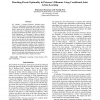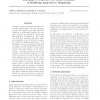34 search results - page 3 / 7 » Playing Games without Observing Payoffs |
CIG
2005
IEEE
13 years 11 months ago
2005
IEEE
— We study by computer simulation a population of individuals playing the prisoner’s dilemma game. Each player has an invariable strategy (cooperate or defect) but the network ...
AAMAS
2007
Springer
13 years 5 months ago
2007
Springer
We consider a repeated Prisoner’s Dilemma game where two independent learning agents play against each other. We assume that the players can observe each others’ action but ar...
DIGRA
2005
Springer
13 years 11 months ago
2005
Springer
In this essay, I examine differences between individual and social play and, in particular, the differences between individual and social play within digital media forms designed ...
CORR
2008
Springer
13 years 5 months ago
2008
Springer
As an attempt to uncover the topological nature of composition of strategies in game semantics, we present a "topological" game for Multiplicative Additive Linear Logic ...
ICML
2003
IEEE
14 years 6 months ago
2003
IEEE
Learning in many multi-agent settings is inherently repeated play. This calls into question the naive application of single play Nash equilibria in multi-agent learning and sugges...


